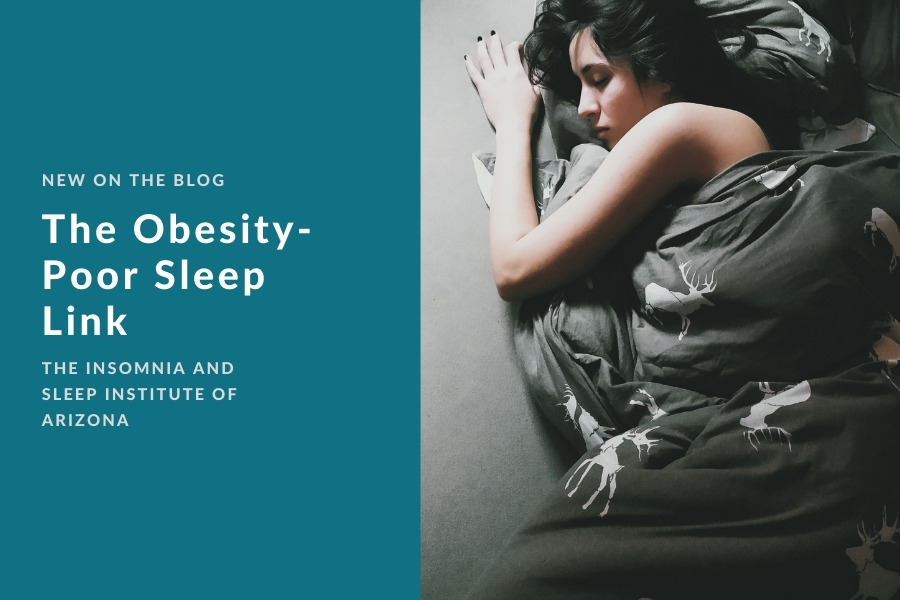Obesity in the United States has been steadily increasing since the 1980s, with the disease now affecting around 12 percent of the adult population on a global scale. The Insomnia and Sleep Institute of Arizona helps patients achieve better sleep with a comprehensive approach, including the consideration of potential co-morbidities such as excess weight. While obesity has been on the rise, so have sleep disturbances, and this is no surprise. There are strong links between the two.
We know that poor sleep and obesity are connected, but many people wonder which came first. This chicken or the egg scenario is actually a bi-directional relationship, but obesity is indeed a cause of sleep disturbances. In fact, obesity is one of the most important risk factors. Studies have shown that if there is an increase of 6 units on the BMI (body mass index scale), that results in someone having a four-fold increased risk of obstructive sleep apnea (OSA). OSA is the most common type of apnea and can oftentimes be treated by a combination of lifestyle changes, sleep hygiene, and CPAP therapy (CPAP may be temporary if the OSA is brought on by obesity and the patient loses weight).
A Heavy Burden
Even patients who are obese and do not have OSA report a decrease in both the quality and duration of sleep. However, it is also important to remember that OSA is vastly under- and misdiagnosed. It is estimated that the vast majority of people with OSA, up to 90-something percent, are undiagnosed. Studies also show that waist circumference is the most predictive component (for both men and women) of sleep disturbances. This is because excess visceral adipose tissue is connected to our sleep regulation and lower sleep quality.
However, it is not always as simple as “lose weight.” Many factors go into causes and exacerbators of obesity, such as fiber intake. Studies have shown that a decrease in fiber intake in an obese person’s diet is also connected to lower sleep quality. Those who have a diet high in saturated fats have decreased N3, also known as slow-wave sleep, which leads to a decrease in sleep quality and longer sleep latency. Many patients who are obese also have GERD, which is unsurprisingly connected to poorer sleep. Finally, there’s also the fact that when a person struggles with OSA, they often don’t have the energy for exercise, which helps progress the obesity-OSA cycle.
Holistic Health
Can sleep disturbance be the primary cause of obesity? One study that followed 14,000 young people over a 4-year period found that ongoing sleep deprivation led to them being 1.4 times more likely to be obese and to have a larger waist circumference. Similar findings were discovered in shift workers as well. It was also found that a higher intake of food high in fat and carbs led to sustained sleep deprivation and, ultimately, obesity. Finally, social jet lag was also connected to an increased risk of becoming obese.
How much sleep is too little, and what qualifies as sleep deprivation? It varies person to person, but overall it is deemed sleep that is less than 6.5 hours per night, and when this occurs there is often a pattern of unhealthy eating habits. “Unhealthy” food is defined as those high on the glycemic index scale. One study of students in 4th and 7th grades looked at those who averaged 6.5 hours of sleep or less (compared to the 10 hours children this age need, on average) and found that those who are sleep deprived craved higher-calorie, sugary foods.
Why Weight and Sleep?
Anyone of any size or weight can struggle with sleep disturbances, but clearly there is a relationship between carrying extra weight and the severity and risk of sleep disturbances. Sleep hygiene and cognitive behavior therapy (CBT-I) can be helpful in addressing both the issues of sleep and obesity. However, for patients who are obese, the best approach is typically to work in tandem with both a sleep specialist and your general physician. You can work on both issues at the same time, and when it comes to the sleep portion you deserve to work with the Face of Sleep Medicine in Phoenix.
We are an outcome-driven facility led by Physician Director Dr. Ruchir P. Patel, a triple board-certified sleep expert. No referral is needed to book your consultation with a sleep specialist. Call the office today, or simply complete the online form for the quickest response.





